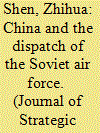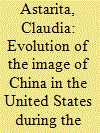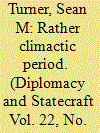| Srl | Item |
| 1 |
ID:
095264


|
|
|
|
|
| Publication |
2010.
|
| Summary/Abstract |
China's entry into the Korean War, together with the involvement of the Soviet Air Force, constituted not only the base of Chinese and Soviet joint assistance to North Korea but also the formation of the Sino-Soviet-North Korean triangular alliance. Recently declassified Russian Defense Ministry archives show that Stalin wavered on dispatching the Soviet Air Force for fear of a direct confrontation with the US/UN forces. It was 12 days after Chinese troops entered the war that Stalin finally allowed the Soviet Air Force to provide air cover. New documents that shed light on this enormously significant historical process demonstrate that the Sino-Soviet-North Korean triangular relationship was extremely delicate and weak.
* An early version of this article was translated by Yang Jingxia and Douglas A. Stiffler, Juniata College. Yafeng Xia, Long Island University, molded the article to its final form.
|
|
|
|
|
|
|
|
|
|
|
|
|
|
|
|
| 2 |
ID:
092416


|
|
|
|
|
| Publication |
2009.
|
| Summary/Abstract |
This article describes the evolution of the image of China in the United States (US) during the Cold War. Aware that China-US bilateral relations have been influenced by periods of conflict and animosity, harmony and détente, the article argues that the image of China has always been embedded in a network of events-birth of the PRC (People's Republic of China [PRC], Korean War, Sino-Soviet alliance) that prevented American public opinion from developing an objective and unbiased picture of the PRC. Since 1950s, China has always been linked to the idea of the 'Yellow Peril'. Moreover, the lack of a direct contact between China and America further thwarted the opportunity of shaping a fair picture of the PRC. Although recognising that during the Cold War American political parties played a significant role in conveying a negative image of China, this article shows how media helped in strengthening Chinese stereotypes among the American public. Analysing all articles published by Time, National Geographic and Readers' Digest from 1949 to 1972, the article highlights both similarities and differences of the way in which these magazines introduced China to their readers.
|
|
|
|
|
|
|
|
|
|
|
|
|
|
|
|
| 3 |
ID:
105219


|
|
|
|
|
| Publication |
2011.
|
| Summary/Abstract |
From the late 1950s, American officials moved toward a proper appreciation of tensions in the Sino-Soviet alliance. However, prior to Autumn 1962 uncertainty remained in Washington over Beijing's willingness to break with the Kremlin in pursuit of its ideological objectives and national ambitions. This article demonstrates how the Sino-Indian border war in November 1962 and Beijing's response to the Cuban Missile Crisis shaped American understandings of the Sino-Soviet dispute and the China threat. Following developments in Autumn 1962 officials in the Kennedy Administration found cause to believe that China was not only the more militant of the two communist powers, but also that it was the more dangerous. This shift in threat perception had a significant impact on the US national security discourse, reinforcing the conviction of senior officials in Washington that the containment of China required a continued policy of non-engagement.
|
|
|
|
|
|
|
|
|
|
|
|
|
|
|
|